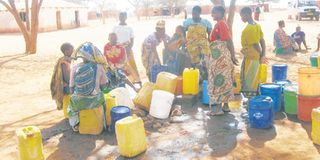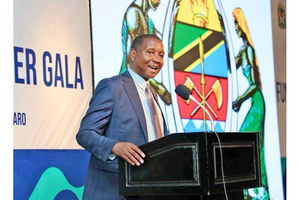Water crisis: Hope fades in village

Women in a queue to fetch water. The late disbursement of funds for water projects has subjected many villagers to untold suffering across the country, a recent report suggests. PHOTO | FILE
What you need to know:
Hope fast fading among villagers who had been promised that by May last year, a Sh521 billion project would end their perennial water woes
Bumbuli. In September 2014, district authorities signed an agreement with a private contractor for a Sh521 billion water project, raising hopes among thousands of villagers who have had to walk at least 5km on a daily basis to the nearest water source.
Many villagers in Kwalei, Mamba Ward, believed that the deal between the Bumbuli District Council and Soswa Engineering Ltd had came just at the nick of time to solve the perennial water problem.
For years, women in this area have had to wake up as early as before 5am to travel several kilometres in search of the precious liquid. That routine could have ended with the agreement -- but it now appears their hopes are fast fading.
Three years since pen was put to paper, there is no sign the project will be completed any time soon, though the government has promised to get it done by end of next month. Meanwhile, for the women in this village, the early morning trips continue.
District authorities say lack of funding has stalled the mega World Bank-funded project -- one of the 10 being implemented under the National Rural Water and Sanitation Program (NRWSP).
“The project was supposed to be completed in eight months. The villagers expected that from at least May 2015, they will have adequate and reliable water supply,” says the District Executive Director, Mr Peter Nyalali.
But the DED is still upbeat. He tells The Citizen that once complete, the project is going to change the villagers’ lifestyle. “We want the women and children to use the time they are spending on fetching water for other productive activities,” said Mr Nyalali.
After failing to get the central government release funds in time, the district council has pushed back its completion target to March 30, this year.
Yet from the central government itself, the pressure for the local authorities to ensure that the multi-billion project is complete has been mounting.
On his recent tour of the districWater and Irrigation deputy minister Issack Kamwelwe warned engineers working on the project that they would face disciplinary action should they fail to meet the new deadline.
According to the Bumbuli council water engineer, Mr Charles Boyi, the project in the district involves the construction of a water source (an 80 metre deep borehole), construction of a pump house, digging of trenches to lay 5,986 meters of water pipes, construction of ten water points, construction of two water tanks to store 45,000 litres and 90,000 litres of water, respectively.
“We believe that this is a more realistic date by which Kwalei villagers can be able to get reliable water supply,” said Mamba Ward Councillor, Ms Zubeda Mtitu.
“We do not want to let our people live on false hopes again. What we want is water and not promises.”
Ms Mtitu, who also doubles as the council vice chairperson, said that engineers from the construction company had been given no room to extent the deadline.
The deputy minister says funds for the project are available, and it is now upon the district council to prepare the request.
But this is not an isolated case. Delays in the release of funds for rural water projects have, for years now, been affecting most local government authorities, according to a report of the 13th Joint Supervision Mission Water Sector Development Program (WSDP) (September 21–October 3, 2014).
The report notes that delays in transferring funds released from the Treasury to LGAs continued to be a major constraint for effective implementation of water programmes.
A case cited in the report is that of Sh80 billion that was released in the last month of the last quarter of financial year 2013/14. But, out of this amount, only small amount of Sh39.9 million was actually transferred to the LGAs.
The report said although the government has taken encouraging action to substantially increase budget allocation to rural water and sanitation projects, concerns are still rife over the delays in releasing funds.
Huge impact on delivery
This was said to be having a huge impact on the delivery of major life-transforming programmes in rural areas, where the majority still have no access to clean and safe water.
“It is disheartening to note that financing that should be available is not disbursed timely to the relevant institutions, thereby not enabling them to carry out critical functions,” the report notes.
“Financial flows should be improved for both contractual obligations and critical operating costs,” the report stresses.
An analysis made by Unicef on the budget also says that government needs to improve the predictability of funding to the water sector, reduce geographical disparities in access to water, invest in sanitation and hygiene, and allocate funds to cover the backlog of weak maintenance.
Bumbuli is within Lushoto District, Tanga Region. According to a recent report, 54.5 per cent of the Lushoto District population now has access to safe and clean water.
There are 58 water supply schemes and 76 shallow wells; 80 villages have water accounts, 152 water committees have been formed in the villages and a water board has been established in Lushoto town.




